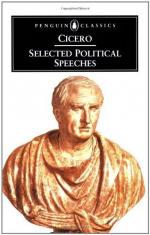
|
| Name: _________________________ | Period: ___________________ |
This test consists of 15 multiple choice questions and 5 short answer questions.
Multiple Choice Questions
1. What is the one thing that could have possibly spared Verres?
(a) The number of times he was wounded in battle.
(b) The length of time he spent in the military.
(c) His donation of several key military weapons.
(d) His military reputation.
2. Which hearing was Verres convicted at after he failed to appear?
(a) The second.
(b) The fourth.
(c) The third.
(d) The first.
3. What was Verres' defense strategy?
(a) To delay the trial.
(b) To eliminate the witnesses.
(c) To slander Cicero.
(d) To prove his innocence.
4. How did Cicero categorize the war's outcome in his speech for Pompey in Chapter 3?
(a) It looked largely lost to all.
(b) It looked largely won to some.
(c) It looked largely won to all.
(d) It looked largely lost to some.
5. What did Cicero promise to the jurors at the end of his first speech against Verres?
(a) To present an indefensible prosecution.
(b) Not to use any tricky legal moves.
(c) To be creative in his attempts to prosecute.
(d) Not to be late for the hearings.
6. For which of the following reasons did Cicero encourage Catiline to go into exile at the end of Chapter 4?
(a) To harm Cicero's reputation.
(b) To help Catiline's reputation.
(c) To avoid execution.
(d) To prolong execution.
7. Did Cicero say that the region Verres governed could be restored to its previous state?
(a) Yes.
(b) No.
(c) Only parts of it could be restored.
(d) Most of it could be restored.
8. Based on what Cicero said in his speech, how did many people feel about the possibility that Verres could use bribery to cause an acquittal?
(a) They were overestimating it.
(b) They were underestimating it.
(c) They were not worried.
(d) They were worried.
9. Besides being a criminal, what was it about Verres that Cicero thought had to be put down?
(a) His rudeness.
(b) His arrogance.
(c) His hypocrisy.
(d) His audacity.
10. Which type of speech were the speeches against Verres considered?
(a) Only judicial.
(b) Only political.
(c) Political and judicial.
(d) Neither political nor judicial.
11. How many letters did Cicero write in condemnation against Catiline and his followers?
(a) Three.
(b) Five.
(c) Two.
(d) Four.
12. How many galleys did Heracleo sail around the coast to taunt the people?
(a) Five.
(b) Two.
(c) Four.
(d) Three.
13. What office did Cicero have when he made the speech for Pompey in Chapter 3?
(a) Tribune.
(b) Censor.
(c) Praetor.
(d) Consul.
14. What did Cicero urge the Roman people to consider about the war in Chapter 3?
(a) Its scale, but not character.
(b) Its character and scale.
(c) Neither its character nor its scale.
(d) Its character, but not scale.
15. When was Cicero elected consul of Rome?
(a) 63 B.C.
(b) 62 B.C.
(c) 64 B.C .
(d) 61 B.C.
Short Answer Questions
1. Where was Cicero's first speech against Catiline given?
2. In Cicero's opinion, what made further conflict inevitable for the Roman people in Chapter 3?
3. How did Cicero end his final speech to Verres in Chapter 2?
4. Which one of the following was assumed to be elected to the consulship and help Verres?
5. What was Cicero describing when he referred to Servilius?
|
This section contains 546 words (approx. 2 pages at 300 words per page) |

|




